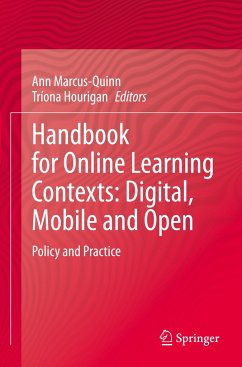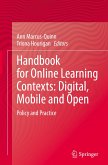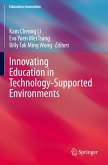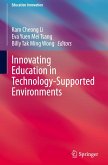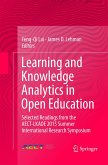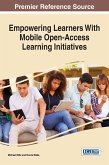Handbook for Online Learning Contexts: Digital, Mobile and Open
Policy and Practice
Herausgegeben:Marcus-Quinn, Ann; Hourigan, Tríona
Handbook for Online Learning Contexts: Digital, Mobile and Open
Policy and Practice
Herausgegeben:Marcus-Quinn, Ann; Hourigan, Tríona
- Broschiertes Buch
- Merkliste
- Auf die Merkliste
- Bewerten Bewerten
- Teilen
- Produkt teilen
- Produkterinnerung
- Produkterinnerung
This book addresses the gap in the literature concerned with global case studies of successful Digital, Mobile and Open Education. The book shares experiences from international teaching and learning projects at all levels of Education, and provides advice for future policy and investment in digital teaching and learning and Open Education projects. It also provides an expectation on the future capacity and sustainability of Open Education.
Andere Kunden interessierten sich auch für
![Handbook for Online Learning Contexts: Digital, Mobile and Open Handbook for Online Learning Contexts: Digital, Mobile and Open]() Handbook for Online Learning Contexts: Digital, Mobile and Open169,99 €
Handbook for Online Learning Contexts: Digital, Mobile and Open169,99 €![Innovating Education in Technology-Supported Environments Innovating Education in Technology-Supported Environments]() Innovating Education in Technology-Supported Environments123,99 €
Innovating Education in Technology-Supported Environments123,99 €![Open Education and Second Language Learning and Teaching Open Education and Second Language Learning and Teaching]() Open Education and Second Language Learning and Teaching43,99 €
Open Education and Second Language Learning and Teaching43,99 €![Open Education and Second Language Learning and Teaching Open Education and Second Language Learning and Teaching]() Open Education and Second Language Learning and Teaching140,99 €
Open Education and Second Language Learning and Teaching140,99 €![Innovating Education in Technology-Supported Environments Innovating Education in Technology-Supported Environments]() Innovating Education in Technology-Supported Environments123,99 €
Innovating Education in Technology-Supported Environments123,99 €![Learning and Knowledge Analytics in Open Education Learning and Knowledge Analytics in Open Education]() Learning and Knowledge Analytics in Open Education77,99 €
Learning and Knowledge Analytics in Open Education77,99 €![Empowering Learners With Mobile Open-Access Learning Initiatives Empowering Learners With Mobile Open-Access Learning Initiatives]() Empowering Learners With Mobile Open-Access Learning Initiatives199,99 €
Empowering Learners With Mobile Open-Access Learning Initiatives199,99 €-
-
-
This book addresses the gap in the literature concerned with global case studies of successful Digital, Mobile and Open Education. The book shares experiences from international teaching and learning projects at all levels of Education, and provides advice for future policy and investment in digital teaching and learning and Open Education projects. It also provides an expectation on the future capacity and sustainability of Open Education.
Produktdetails
- Produktdetails
- Verlag: Springer / Springer International Publishing / Springer, Berlin
- Artikelnr. des Verlages: 978-3-030-67351-2
- 1st edition 2021
- Seitenzahl: 392
- Erscheinungstermin: 31. Mai 2022
- Englisch
- Abmessung: 235mm x 155mm x 22mm
- Gewicht: 593g
- ISBN-13: 9783030673512
- ISBN-10: 3030673510
- Artikelnr.: 63953775
- Herstellerkennzeichnung Die Herstellerinformationen sind derzeit nicht verfügbar.
- Verlag: Springer / Springer International Publishing / Springer, Berlin
- Artikelnr. des Verlages: 978-3-030-67351-2
- 1st edition 2021
- Seitenzahl: 392
- Erscheinungstermin: 31. Mai 2022
- Englisch
- Abmessung: 235mm x 155mm x 22mm
- Gewicht: 593g
- ISBN-13: 9783030673512
- ISBN-10: 3030673510
- Artikelnr.: 63953775
- Herstellerkennzeichnung Die Herstellerinformationen sind derzeit nicht verfügbar.
Ann Marcus-Quinn is a lecturer in Technical Communication and Instructional Design at the University of Limerick, Ireland. She is currently the Course Director for the Masters in Technical Communication and E-Learning. Ann has been awarded both national and international funding for her research. In a previous role Ann worked with the National Digital Learning Resources service (NDLR) as a national advocate for Open Educational Resources. Tríona Hourigan is a teacher and researcher employed by the Department of Education and Skills, Ireland. She received her B.A. in Language and Cultural Studies, Masters in French, PhD in Education and Grad. Dip in Education from the University of Limerick, Ireland. Prior to joining the Department of Education and Skills, she worked as a post-doctoral research fellow in the area of ICT in Education at the University of Limerick. Tríona was a member of the Management Committee for the COST Action eREAD which published the StavangerDeclaration in 2019.
Chapter 1. Introduction and Overview of Chapters.- Chapter 2. OER and the Future of Digital Textbooks.- Chapter 3. Formulated Professional Identity of Learning Designers and the Role of Open Education in Maintaining that Identity.- Chapter 4. Connected Learning in Virtual Classrooms for a Master's in Teacher Training at one University in Madrid, Spain.- Chapter 5. Teaching methodologies for Scalable Online Education.- Chapter 6. Mobile devices and mobile learning in Greek secondary education: Policy, empirical findings and implications.- Chapter 7. An exploration of Chinese students' self-directed mobile learning outside school: practices and motivation.- Chapter 8. Outdoor learning with apps in Danish open education.- Chapter 9. Language Track: an open education resource for supporting professional development in Norwegian ECEC institutions.- Chapter 10. Multiplying awareness of open practices and educational resources.- Chapter 11. Beyond Mindfulness Mondays: The Potential of Open Education to Support Whole School Wellbeing. A Case Study from Australia.- Chapter 12. Mobile-assisted language learning in a secondary school in Iran: Discrepancy between the stakeholders' needs and the status quo.- Chapter 13. The current status of Open Education Practices in Japan.- Chapter 14. A critical review of emerging pedagogical perspectives on mobile learning.- Chapter 15. Implementing Open Pedagogy in Higher Education: Examples and Recommendations.- Chapter 16. Overcoming transactional distances for atypical learners in workplace m-learning.- Chapter 17. The Professional Development of Teachers Using Tablets in Bilingual Primary Classrooms.- Chapter 18. Learning Alone Or Learning Together? How Can Teachers Use Online Technologies To Innovate Pedagogy? .- Chapter 19. The Affordances and Constraints of Digital Solutions for Learning Support and for Outreach.- Chapter 20. Comparative judgment: An overview.- Chapter 21. T-REX (Teachers' Research Exchange): Infrastructuring teacher researcher collaboration through an open educational ecosystem.- Chapter 22. The Role Of Remote Observation In The Professional Learning Of Student Teachers And Novice Placement Tutors.- Chapter 23. Exploring the ripple effect of 'always on' digital work culture in secondary education settings.
Chapter 1. Introduction and Overview of Chapters.- Chapter 2. OER and the Future of Digital Textbooks.- Chapter 3. Formulated Professional Identity of Learning Designers and the Role of Open Education in Maintaining that Identity.- Chapter 4. Connected Learning in Virtual Classrooms for a Master's in Teacher Training at one University in Madrid, Spain.- Chapter 5. Teaching methodologies for Scalable Online Education.- Chapter 6. Mobile devices and mobile learning in Greek secondary education: Policy, empirical findings and implications.- Chapter 7. An exploration of Chinese students' self-directed mobile learning outside school: practices and motivation.- Chapter 8. Outdoor learning with apps in Danish open education.- Chapter 9. Language Track: an open education resource for supporting professional development in Norwegian ECEC institutions.- Chapter 10. Multiplying awareness of open practices and educational resources.- Chapter 11. Beyond Mindfulness Mondays: The Potential of Open Education to Support Whole School Wellbeing. A Case Study from Australia.- Chapter 12. Mobile-assisted language learning in a secondary school in Iran: Discrepancy between the stakeholders' needs and the status quo.- Chapter 13. The current status of Open Education Practices in Japan.- Chapter 14. A critical review of emerging pedagogical perspectives on mobile learning.- Chapter 15. Implementing Open Pedagogy in Higher Education: Examples and Recommendations.- Chapter 16. Overcoming transactional distances for atypical learners in workplace m-learning.- Chapter 17. The Professional Development of Teachers Using Tablets in Bilingual Primary Classrooms.- Chapter 18. Learning Alone Or Learning Together? How Can Teachers Use Online Technologies To Innovate Pedagogy? .- Chapter 19. The Affordances and Constraints of Digital Solutions for Learning Support and for Outreach.- Chapter 20. Comparative judgment: An overview.- Chapter 21. T-REX (Teachers' Research Exchange): Infrastructuring teacher researcher collaboration through an open educational ecosystem.- Chapter 22. The Role Of Remote Observation In The Professional Learning Of Student Teachers And Novice Placement Tutors.- Chapter 23. Exploring the ripple effect of 'always on' digital work culture in secondary education settings.

